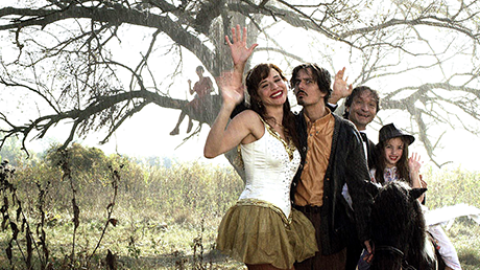Festivals: Thessaloniki
After a three-year hiatus from the Thessaloniki film festival—and from Greece, a country whose tough political and financial woes have only worsened in that time—it was with mixed emotions that I returned for its 56th edition. But within hours, the city—so warm in both its reception and its unseasonable temperatures—won me over yet again with its one-of-a-kind energy. Businesses were bustling and theaters, as always, overflowed with enormously enthusiastic attendees. A great perk of the festival, which ran this year from November 6 to 15, is that they offer free rush tickets to students, senior citizens, and the unemployed at all afternoon shows. But no matter the means of acquiring a seat, everyone just always seemed to feel thrilled—and perhaps a little lucky—to be there.
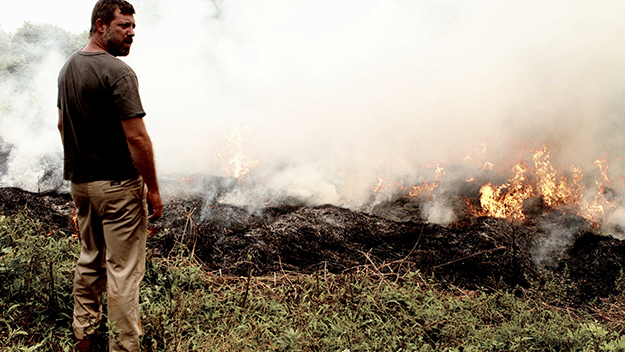
La tierra roja
The first screening I attended, La tierra roja, set me off on a string of films that challenged audiences to spend time with—and gradually sympathize with—morally questionable characters. In the opening scene we see our antihero, the bearded and ruggedly handsome Pierre, stumble across a half-dead peccary in the rain forest. He puts the boar-like animal out of its misery and for a brief moment we place our trust in him, while poachers are instead put into question. But it soon becomes apparent that Pierre (Geert Van Rampelberg), a Belgian living in Misiones Province in the northeast corner of Argentina, is causing serious harm in the area. He may be accepted in certain corners for providing jobs (and for coaching rugby on the side), but his lumber company is clearing the land and using pesticides that are poisoning the locals and causing serious birth defects. But as Pierre witnesses the alarming consequences firsthand and falls deeper for Ana, a single mom and a teacher/activist who is passionately drawn to him in return despite herself, he does an about-face and joins the fight against the other unethical companies using these agrotoxins, eventually redeeming himself in the eyes of the locals and audiences alike… though perhaps too late. A former DP who’s worked twice with Carlos Reygadas, Argentine director Diego Martínez Vignatti may steer his action dangerously close to “message film” territory, but La tierra roja ultimately misses it, telling a vital story that haunts you with its beautiful misery.

Blue Blood
At the center of Lírio Ferreira’s visual feast Blue Blood resides a brute of another kind. Zolah (the preternaturally sexy Daniel de Oliveira) returns home to the gorgeous Brazilian island of his birth and to the circus life after being mysteriously sent away by his mother more than 20 years earlier. He’s grown into an empty man, a true womanizer clearly bogged down from the weight of the past—and the sort of protagonist that audiences can’t easily warm up to. As he reintegrates himself into his former world, taking up his Cannonball Man act once again, the emotional dramas of his family and fellow performers bubble to the surface—most dangerously his forbidden feelings for his sister, who’s engaged to be married. By turns energetic, showy, and tension-filled, the movie itself is something of a three-ring extravaganza, an experience that’s both unusual and highly unnerving.
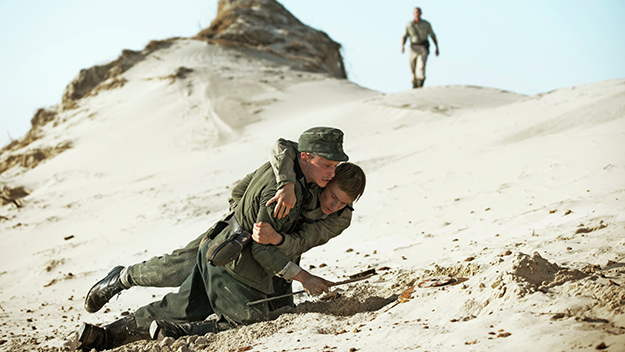
Land of Mine
The fierce and narratively bold French Blood forces viewers to watch the grueling, decades-long transformation of a skinhead into someone who finally feels remorse for his actions, yet it doesn’t quite justify itself as a worthwhile journey. On the other hand, Land of Mine, which takes another easy “villain”—Nazi soldiers—as its central figure and humanizes them fully, is essential viewing. Martin Zandvliet’s masterful, devastating film focuses on a group of young POWs—babies really—who just after the end of World War II are put on land-mine duty, ordered to dig up the two million that remain live on the beaches along Denmark’s western coast. The sergeant in charge, who, true to conventions, is an abusive son of a bitch, treats the German boys like dirt—to him they are the bitter enemy, and even watching them starve doesn’t phase him at all. But as time passes, he warms up to them, even grows protective of them, but because their task is such an ill-fated one, the role of protector can mostly be in vain.
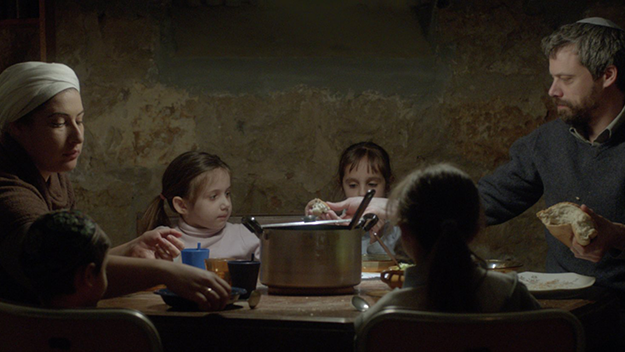
Mountain
The lines between good and evil are also blurred in Yaelle Kayam’s intriguing feature debut, Mountain. But here you immediately sympathize with the lead character; it’s only gradually that her motivations are put into question. Tzvia (a calmly commanding Shani Klein) is a devout Orthodox mother of four who spends her solitary days tending to domestic duties in the family house on the grounds of an ancient cemetery atop Jerusalem’s Mount of Olives—a terrible place to live but a striking setting for a film. Her husband is barely present, even when he’s at home, and she doesn’t seem to fully connect with her children. Somewhere inside there’s a vibrant young woman yearning for human interaction. One night while out having a cigarette, she witnesses a prostitute in action in her backyard graveyard, and Tzvia becomes drawn to this strange new world of sex and drugs, hanging around the nightly visitors and also providing them with home-cooked meals. The film keeps us—close observers of an observer—quietly transfixed throughout, but it’s disappointing that after so intensely agonizing over the mundanities of everyday life, it rewards audience patience with a frustrating tease of an ending.
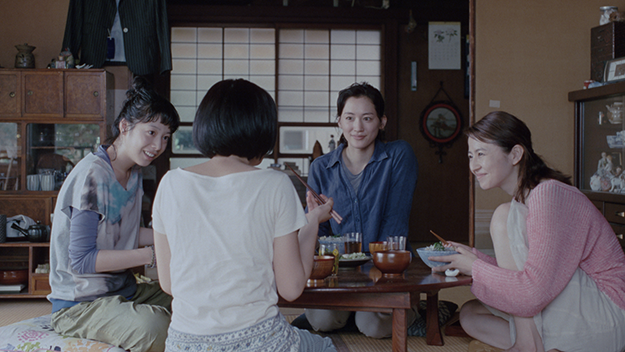
Our Little Sister
Hirokazu Kore-eda’s Our Little Sister takes what could have been a contentious character and the source of heated family drama and turns the setup into something of beauty. Fifteen-year-old Sachi is the offspring of a philandering father, who abandoned his family for hers. At his funeral, Sachi meets her three half-sisters, who range in age from late teens to late twenties, and are completely diverse in personality: the eldest is serious, business-minded, closed off emotionally; the middle, more fun-loving and partying; and the youngest, a totally likable goofball. But instead of resenting Sachi, who’s now alone in the world, they take her in to the home they share in Kamakura. Some serious sister-bonding occurs—which, because this is a Kore-eda film, of course includes the ritual of food preparation—but her presence also opens the door to the girls examining their own abandonment issues as well as their places in the world. Kore-eda’s best, most moving work since 2009’s Air Doll, Our Little Sister, like the earlier film, manages to be both fluffy and profound.
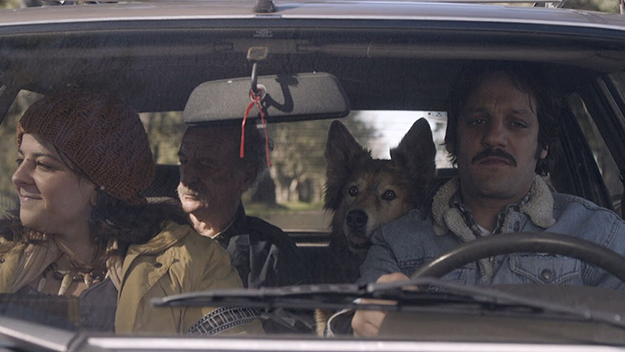
Road to La Paz
Sometimes at a festival you must resort to selecting what you see based on a completely arbitrary detail in a plot description. In the case of Francisco Varone’s Road to La Paz (the winner of a special jury prize), it’s mentioned that the main character drives a Peugeot 505—the car of my teenage years—and that was all it took. It was a stroke of luck, in retrospect, for I might have otherwise missed this genuine charmer, which on paper threatens to be just another quirky, generic road movie. A very good Rodrigo de la Serna plays Sebastian, a down-on-his-luck guy in Buenos Aires whose landline in the new apartment he and his wife move into was formerly the phone number of a car service. At first the frequent calls are annoying, but he soon decides to use them to his advantage and begins taxiing people around for cash. One of his loyal “customers,” a terminally ill Muslim man, takes a liking to Sebastian and asks him to drive him the nearly 2,000 miles to La Paz so he can visit his brother and eventually Mecca before his death. Sebastian, unable to deny the paycheck, reluctantly agrees, and it turns out to be a life-altering trip, on which they acquire another passenger, two dogs, and some life perspective along the way. Every festival needs warm, uplifting movies in the mix to lighten up the usually weighty load, and Our Little Sister and Road to La Paz fit the bill perfectly.



